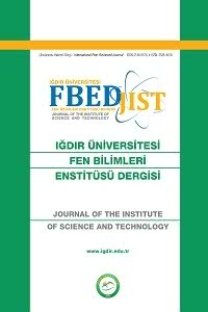Arıtılmamış Suyun Elektrokimyasal Muamele ile Değerlendirilmesi ve Optimizasyonu
İstatistiksel teknik, ham su, elektrokimyasal muamele, sedimantasyon, kirleticiler
Assessment and Optimization of Electrochemical Treatment of Typical Raw Water
___
- APHA, 1998. Standard method for the examination of water and wastewater, 20th edn, America Water Works Association and Water Pollution Control Federation, Washington DC.
- Chen, G., 2004. Electrochemical technologies in wastewater treatment separation. Puri cation Technologies, 38(1):11- 41.
- Chin, D.A., 2000. Water Resources Engineering, 1st edn. Prentice Hall, Englewood Cliffs.
- Drouichel, M., Lounicil, H., Marneril, N., Piron, D.L., Kharroune. M., 2001 Utilisation of factorial experiments for the UVIH2O2 process in a batch reactor. Water SA., 27:551-558.
- Gardiner, W.P., Gettinby, G., 1998.Experimental Design Techniques in Statistical Practice, 2nd Edn., Harwood Publishing, Chichester.
- Guttman, L., Wilks, S.S., Hunter,. J.S., 1971. Introductory Engineering Statistics. 2nd Edn, John Wiley and Sons Inc, New York.
- Khanniche, M.S., Morgan, P.G., Khanniche, K.N., Jobling, C.P., Khanniche, N., 2001. A novel electro -chemical process for water treatment.rev. energ. ren. Power Engineering. 63-67
- Lei, Y., Shen, Y., Chen, X., Jia, J., Wang, W., 2006. Preparation and application of Nano-TiO2 catalyst in dye electrochemical treatment,Water SA 32 (2): 206–210.
- Oke, I.A. Babatola, J.O., Adekunbi, E.A., Obijole, A.O., Fehintola, E.O., 2012. An Overview of electrochemical treatment processes in environmental engineering: previous studies on electrochemical treatment processes (1973-2004). In Water Treatment Processes, Editor: Kostas Demadis, Nova Science Publishers, Inc. New York.
- Oke, I.A. Oladepo, K.T., Fehintola, E.O., Adekaunbi, E.A., Obijole, A.O., Basil, O.N., Mohammed, H., 2012. An overview of electrochemical treatment processes in environmental engineering: modern studies on electrochemical treatment processes (2005- 2010) In Water Treatment Processes, Editor: Kostas Demadis, Nova Science Publishers, Inc. New York.
- Oke, I.A., 2009. Orthogonal experiments in the development of carbon –resin for chloride ions removal. Statistical Methodology. 6: 109–119.
- Oke, S.A., Awofeso, K.O., 2006. A factorial analysis experimentation of inappropriate waste disposal, Iran Journal of Environmental Health Sciences Engineering, 3 (2):123–132.
- Oke, I.A., 2007. Development and performance-testing of an electrochemical process on selected industrial wastewaters Unpublished Ph.D. Thesis, Department of Civil Engineering Obafemi Awolowo University, Ile-Ife, Nigeria.
- Polcaro, A.M., Palmas, S., Lallai, A., 2001. Sequential electrochemical/biological treatment for the removal of 2, 6-dichlorophenol from synthetic wastewater, Annales de Chimie 91 (4): 203–210.
- Polcaro, A.M., Mascia, M., Palmas, S., Vacca, A., 2002. Electrochemical oxidation of p-hydroxybenzoic and protocathecuic acids at a dimensional stable anode (DSA) in the presence of NaCl, Annales de Chimie 92 (10): 1015– 1023.
- Rajkumar, B., Palanivelu, K., Mohan, N., 2001. Electrochemical oxidation of resorcinol for wastewater treatment using Ti/TiO2- RuO2-IrO2 electrode, Journal of Environmental Sciences Health A Tox Hazard Substantial Environmental Engineering 36 (10):1997–2010.
- Steel, E.W., Mcghee, J.T., 1979: Water supply and sewerage, 3rd edn. McGraw Hill Book Company, Tokyo.
- Tebbutt, T.H.Y., 1991. Principles of Water Quality Control, 3rd edn. Pergamon Press, Oxford.
- Viessman, W., Hammer, M., 1993. Water Supply and Pollution Control. Harper Collins College Publishers, New York.
- Yoshida, K., Yoshida, S., Seki, Y., Takahashi, T., Ihara, I., Toyoda., K. 2007. Basic study of electrochemical treatment of ammonium nitrogen-containing wastewater using boron- doped diamond anode. Sei Technical Review, 65: 71-73.
- ISSN: 2146-0574
- Yayın Aralığı: 4
- Başlangıç: 2011
- Yayıncı: -
Arıtılmamış Suyun Elektrokimyasal Muamele ile Değerlendirilmesi ve Optimizasyonu
İsaiah Adesola OKE, Ezekiel Oluwaseun FEHINTOLA, Olumuyiwa Adewale OBIJOLE, Olutoyin FASUYİ- ENANG, Enoch Adedayo ADEKUNBİ, Hammed Olawale OLOYEDE
Assessment and optimization of electrochemical treatment of typical Raw water
Isaiah Adesola OKE, Ezekiel Oluwaseun FEHINTOLA, Olumuyiwa .Adewale OBIJOLE, Olutoyin ENANG FASUYİ, Enoch.Adedayo ADEKUNBİ, Hammed .Olawale OLOYEDE
Adsorption kinetics of Pb2+ removal from aqueous solutions using spent batteries
Ahmet Metin KUMLAY, Neşet ARSLAN, Canan KAYA
Nihal KOCAKAPLAN, Neşe ERTUGAY, Emine MALKOÇ
Atık Pilleri Kullanarak Sıvı Çözeltilerden Kaldırılan Pb2+’nin Adsorbsiyon Kinetiği
PETKİM Atıksuyundan Kaprolaktam Geri Kazanımında Uygulanmış Özgün Bir Metot
Türkiye'de tarımsal üretim ile tarımsal kredi kullanımı arasındaki nedensellik ilişkisi
Mustafa TERİN, Adem AKSOY, İrfan Okan GÜLER
Bazı Kayısı Çeşitlerinin Bingöl Bölgesindeki Gelişim Durumlarının Belirlenmesi
Abdullah OSMANOĞLU, Tuncay KAYA, Barış DEMİRHAN
Yurdanur AKYOL, Canan ÖZDEMİR, Kadriye YETİŞEN, Bahattin BOZDAĞ
